LECTURE TO THE STUDENTS OF IIT KARAGPUR AT KARAGPUR, WEST BENGAL(LECTURE-I)
17-05-2007 : IIT, KARAGPUR
Dimensions of Nano Science and Technology
I am indeed delighted to be with the students and Faculty of IIT, Karagpur in this special lecture series on Nanotechnology. My greetings to the students and faculty members. Today morning, let me first talk to you on the topic "Dimensions of Nano Science and Technology".
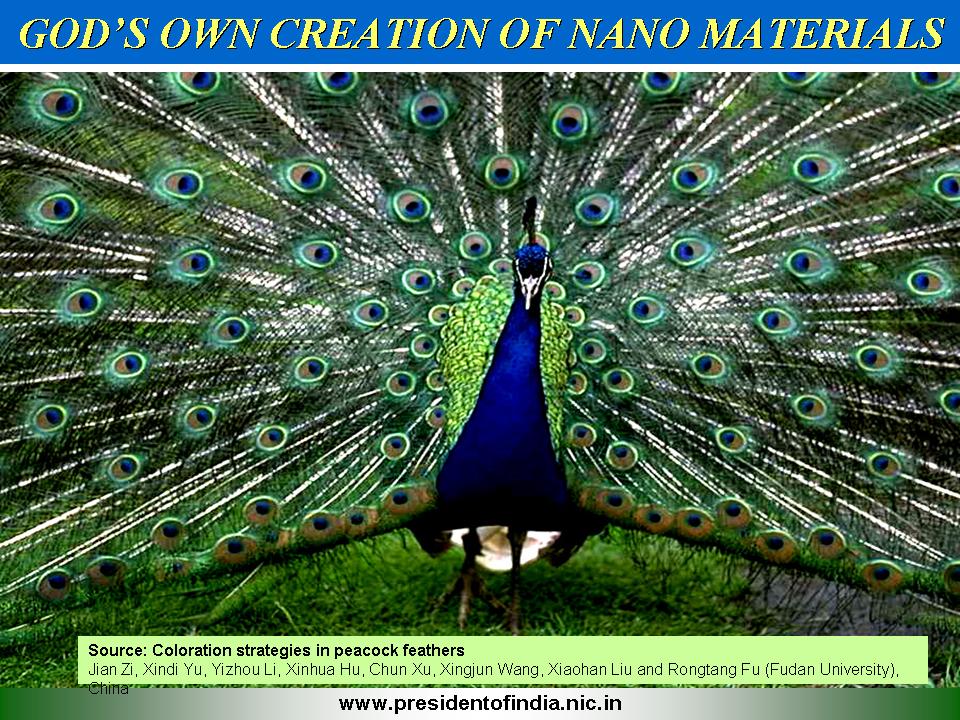
Whenever I go for a morning walk in the Mughal Garden, I see the peacocks dancing with its colourful feathers, during this season. When I look at the deep and beautiful colours on the feathers of the peacock in the Rashtrapati Bhavan, I have often wondered how even after many years, the colour of the peacock feather does not fade away. I recall as a young kid, I used to keep peacock feathers in my books. This phenomenon of long lasting original colour to the peacock has come from the God's own creation of nano materials, coated in a peacocks feather and they diffract light, which gives us the rich colours.
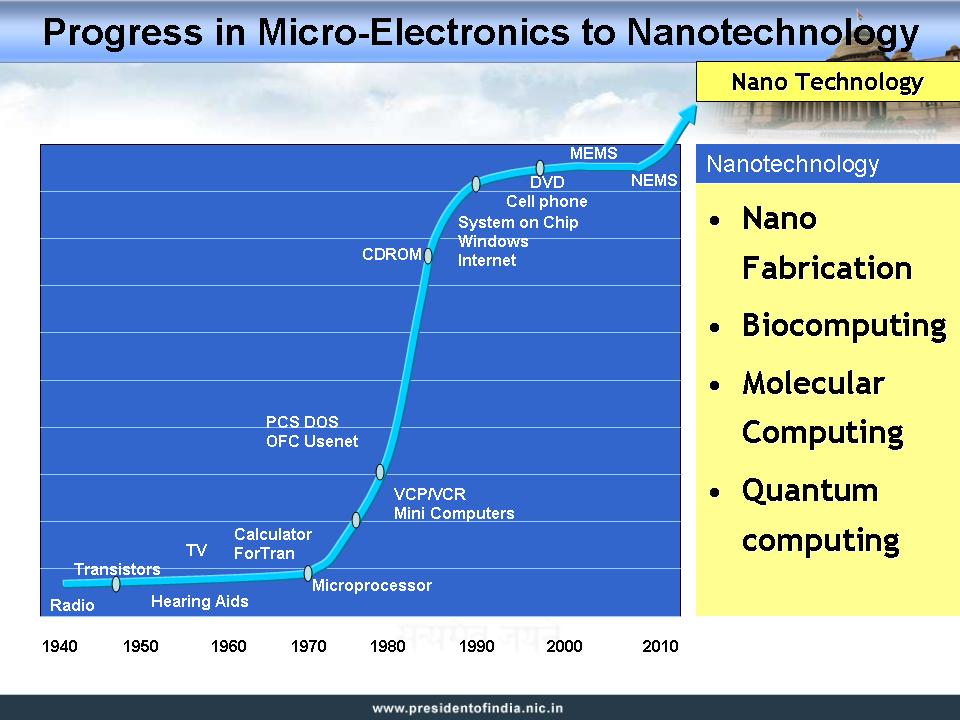
Humanity has seen rapid transformation in the manufacturing in the last 150 years. This revolution continued with the introduction of Numerical Controlled Robotics. Lately we are witnessing new trends with the introduction of software and design tools. During the last six decades the progress in micro electronics has been phenomenal and has added a new dimension to manufacturing. We have made considerable progress from micro processor in 1970?s to MEMS in 2000 and to Nano technology now. The future belongs to nano fabrication, bio-computing, molecular computing and quantum computing.
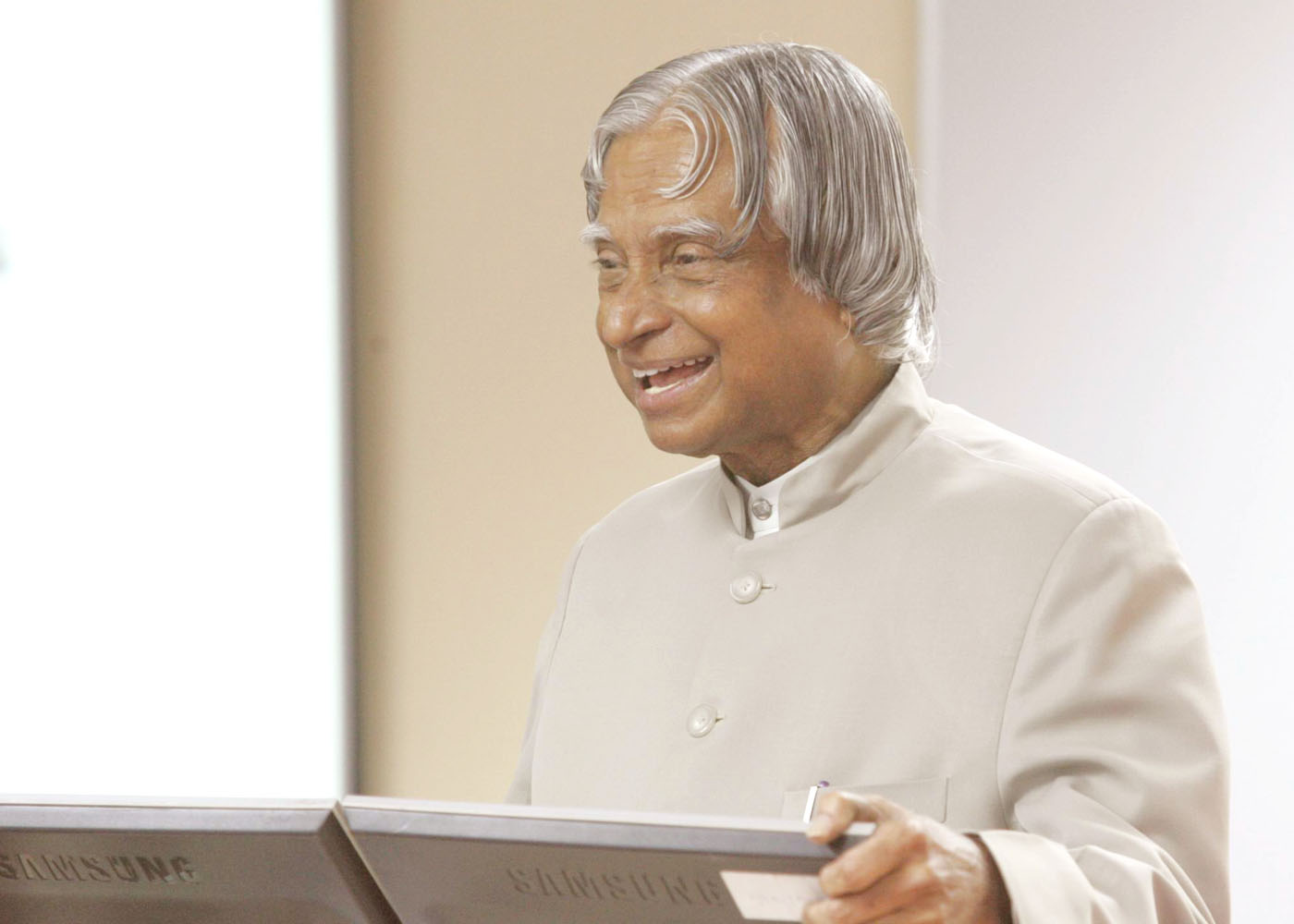

Biological Molecular Complexity
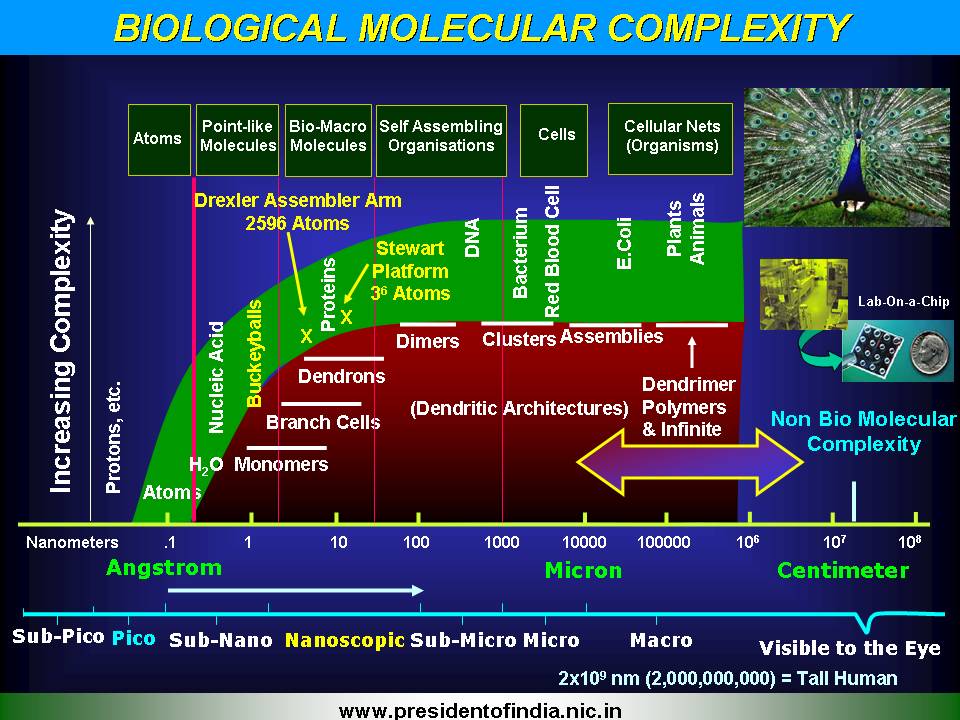
Every thing in this universe ? from giant stars to our bodies work on molecular scale. Our hearts and lungs are big objects but all the processes take place at the molecular level. Therefore, everything in our body and in the physical universe is already based on nanotechnology. Observation of the nature and the role of science in understanding it from our research in nano sciences can be converted into a technological product by using the same or similar nano materials which gave the natural colour for the peacock feather, as part of our shirts, sarees, fabric and apparels. It is a welcome destination for science to mature into technology and become a product of utility for the society.
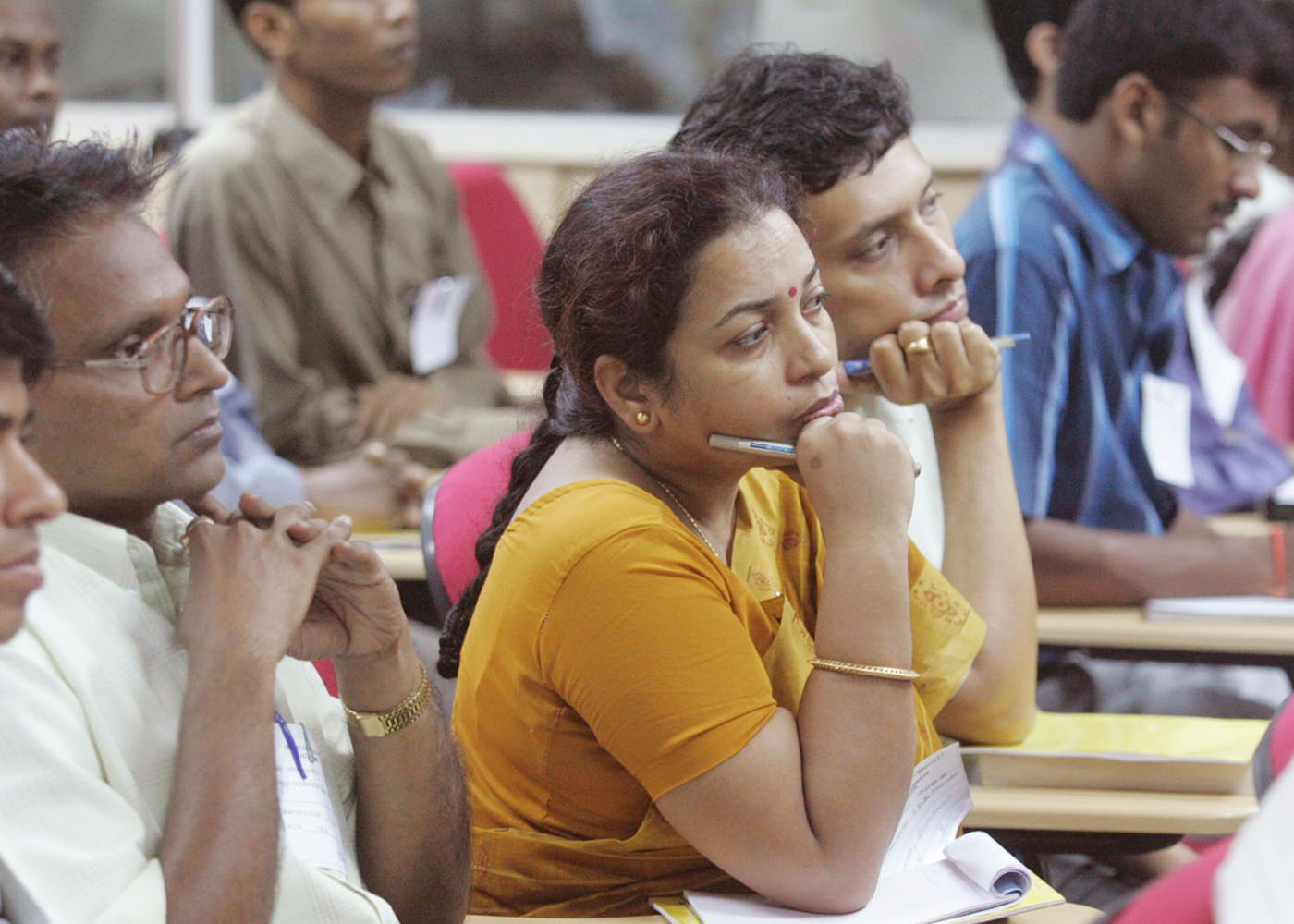

Technology through Ages
Through out the last 120 centuries, unique cultures have come into existence due to advancement in technology. The first 118 centuries had a dominance of primarily stone, bronze & iron ages. The last two centuries have seen rapid development of chemical age. The advancements made in material science and technology gave the impetus for both nuclear and biological age to flourish. Succession of these technology periods has involved progression from simpler materials to more complex forms of science and engineering. We are today at the convergence of Nano, Bio and Information technologies. This age, I feel will create historical revolution and we must be at driver?s seat to contribute towards this societal change.
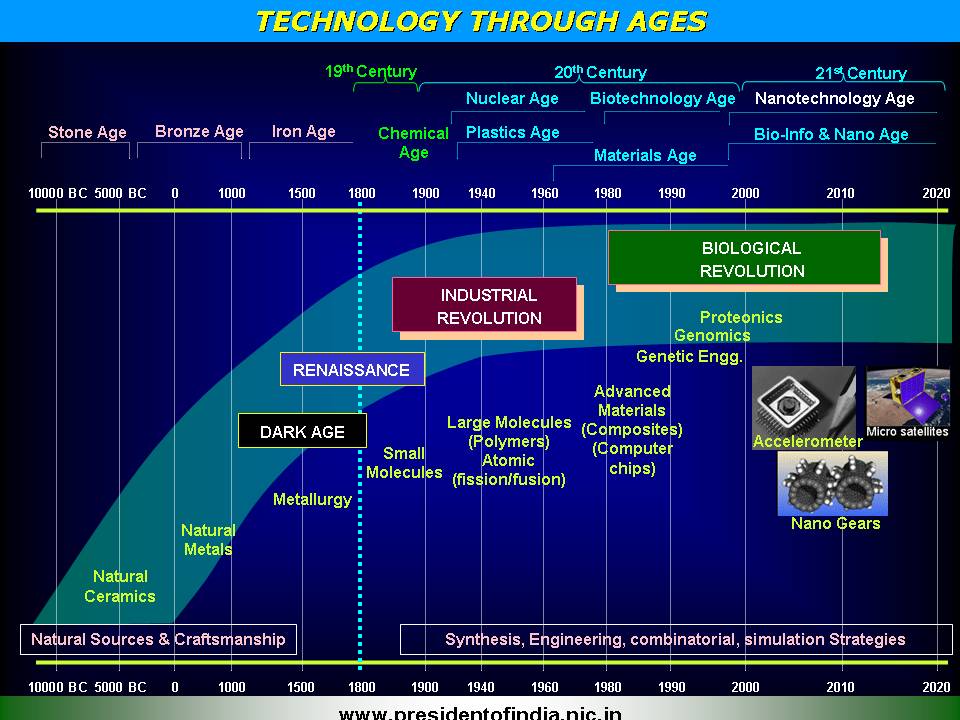
When I think of Nanoscience and Nanotechnology, I am reminded of three personalities. First person is Richard Feynman, who described the concept of 'building machines" atom by atom in his talk at Caltech titled "There is plenty of room at the bottom". The second person is Eric Drexler, who wrote the book titled 'Nano Systems, Molecular machinery, manufacturing and computation". The third person is Prof. CNR Rao, who pioneered and fostered the nano science research in India.
Since independence, the country had all along been taking recourse to technology for societal changes and economic prosperity. A nation that is alert should be sensitive to the changes that take place to the technological fabric of the world and prepare itself for the arrival of newer changes in the horizon.
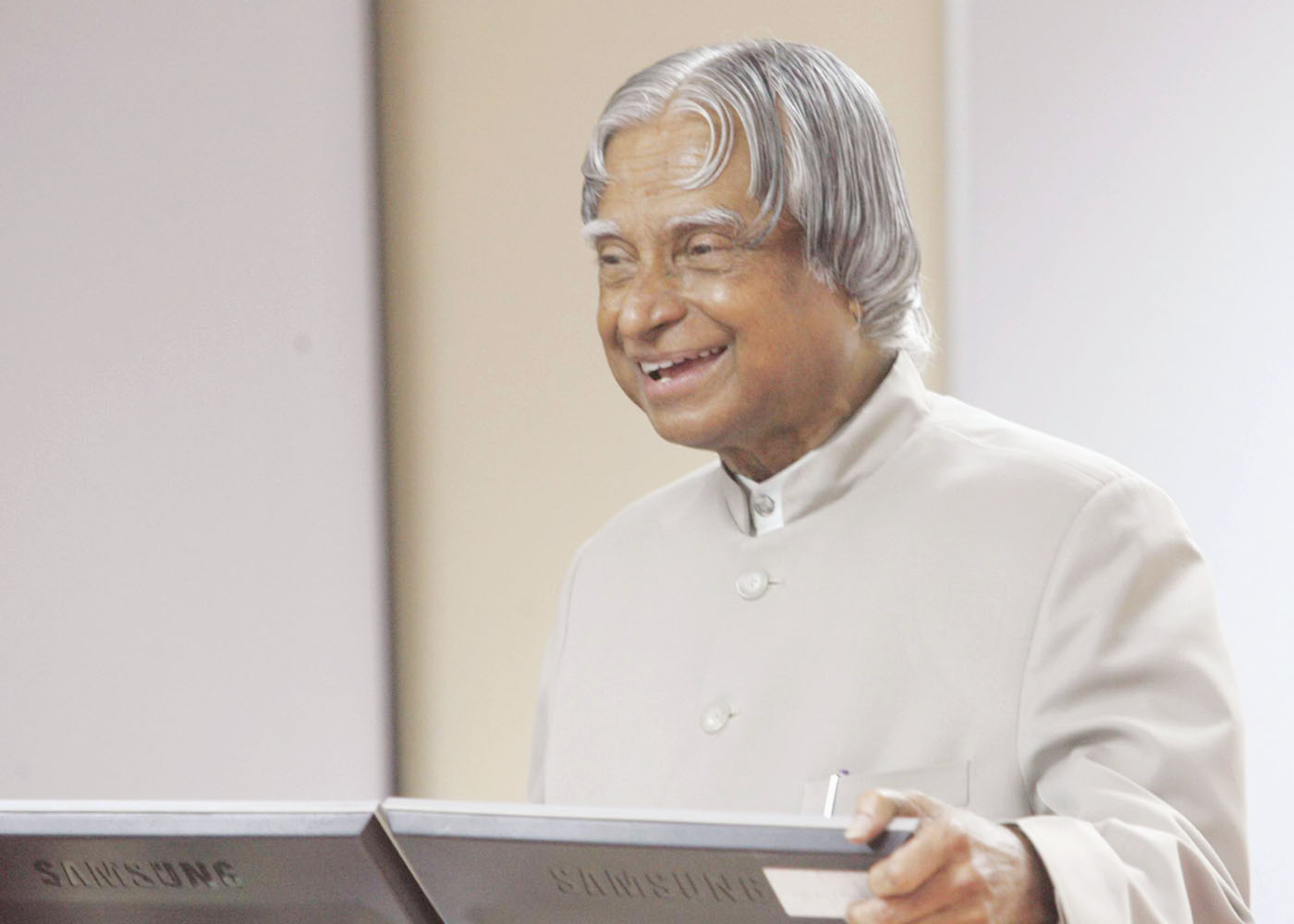
As the country was acquiring the technologies of steel, agriculture, space, missiles and IT, we grew to be anywhere between third to fifth nation in figure of merit. In information technology we have a possibility of becoming the third knowledge power. We believe that nanotechnology would give us an opportunity, if we take an appropriate and timely action to become one of the important technological nations in the world.
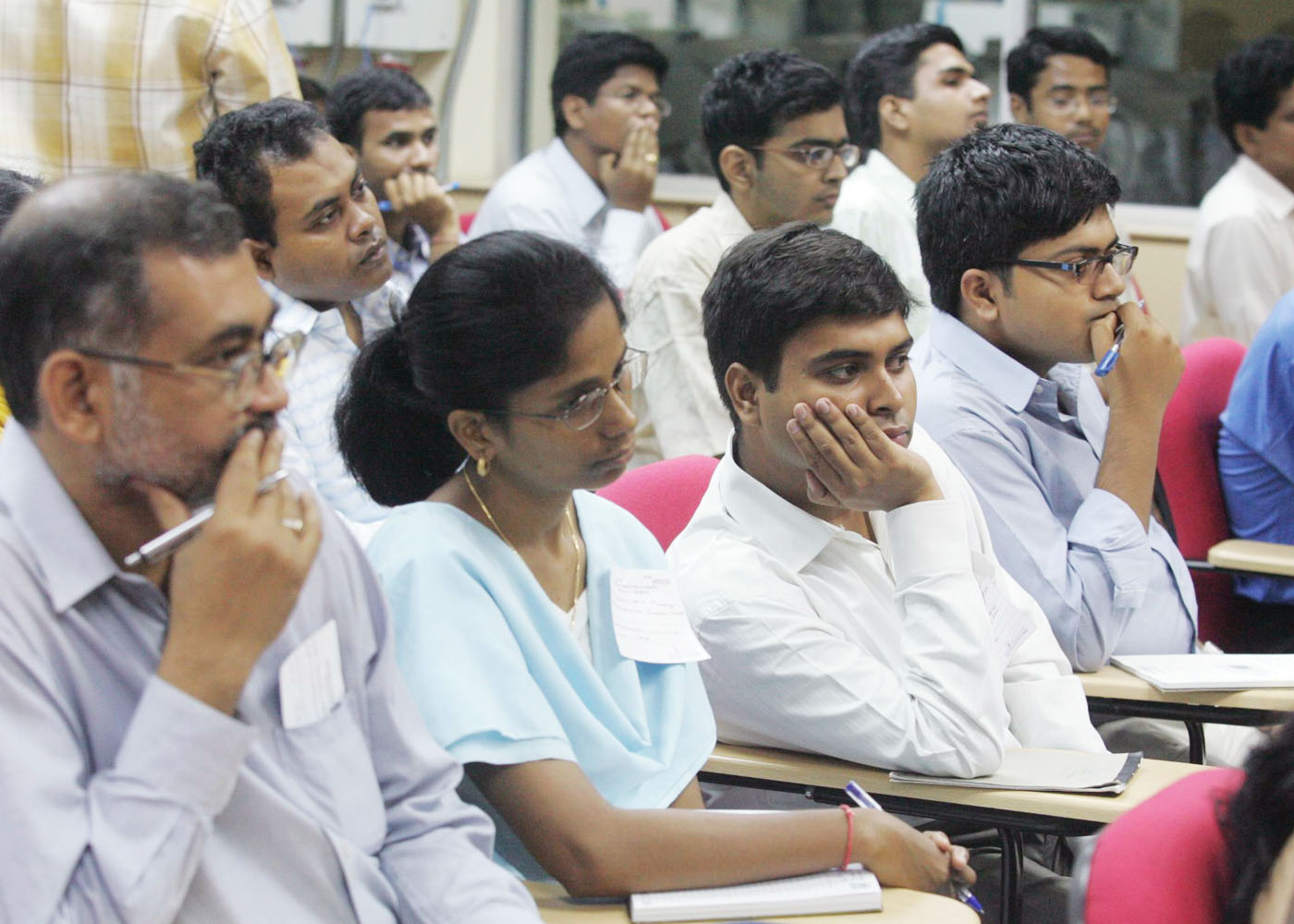

Applications
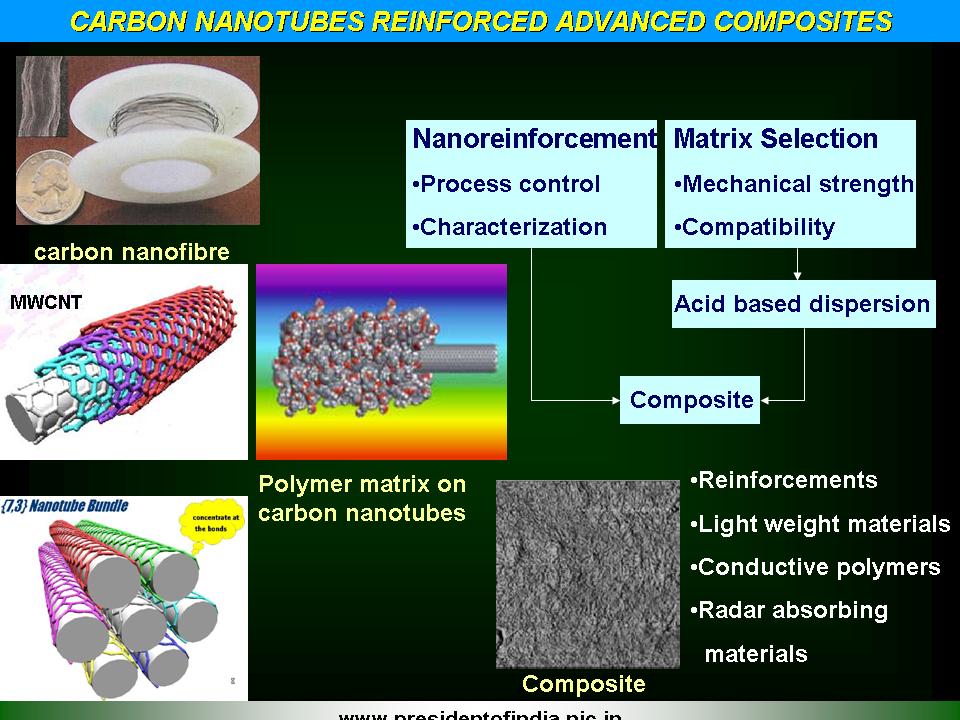
The world market for nano materials, nano tools, nano devices and nano biotechnology put together is expected to be nearly two hundred billion dollars. It has been noticed that the fastest growing area among these is nanobiotechnology.
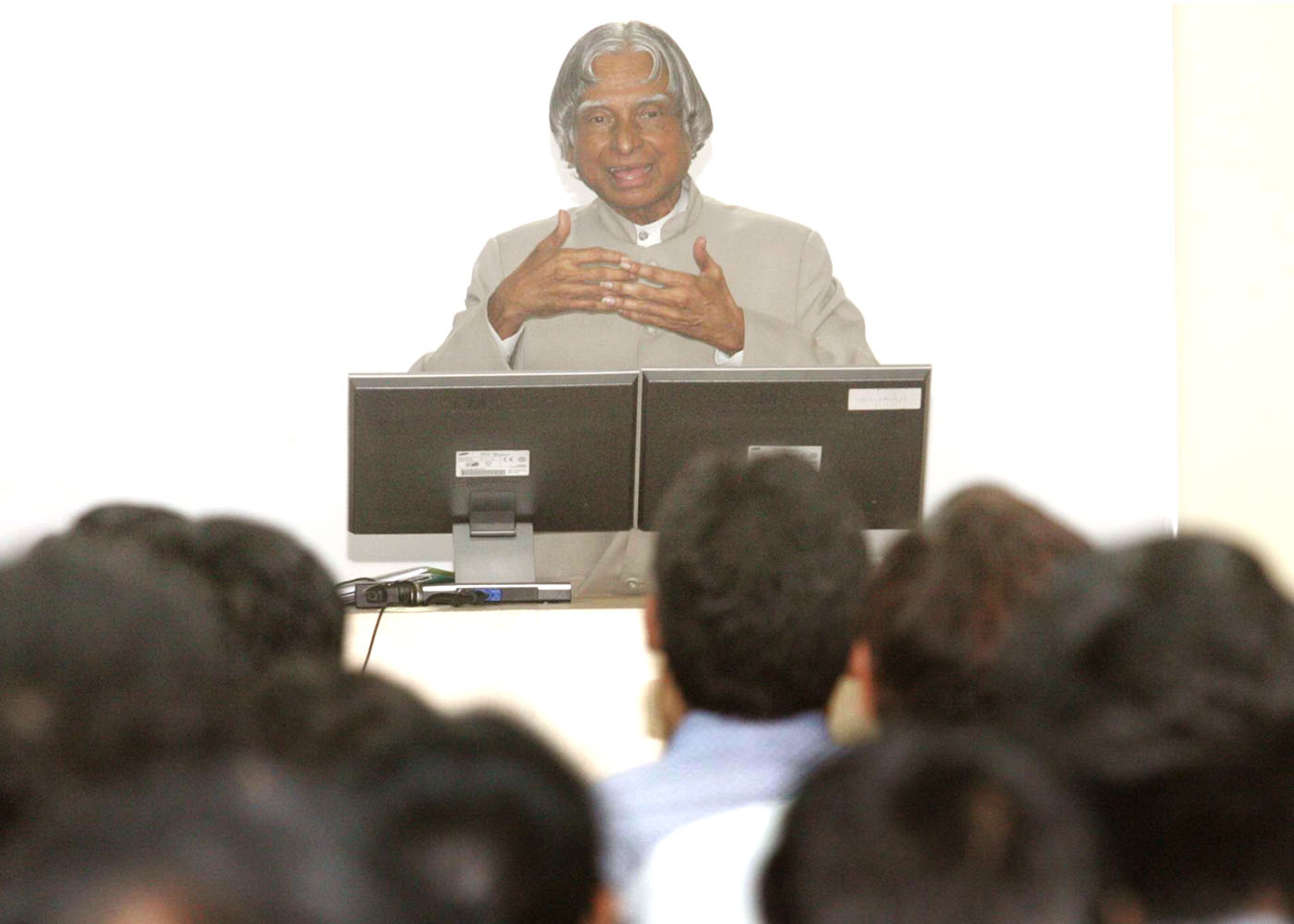
CNT and Composites: Carbon nano tubes and its composites will give rise to super strong, smart and intelligent structures in the field of material science.
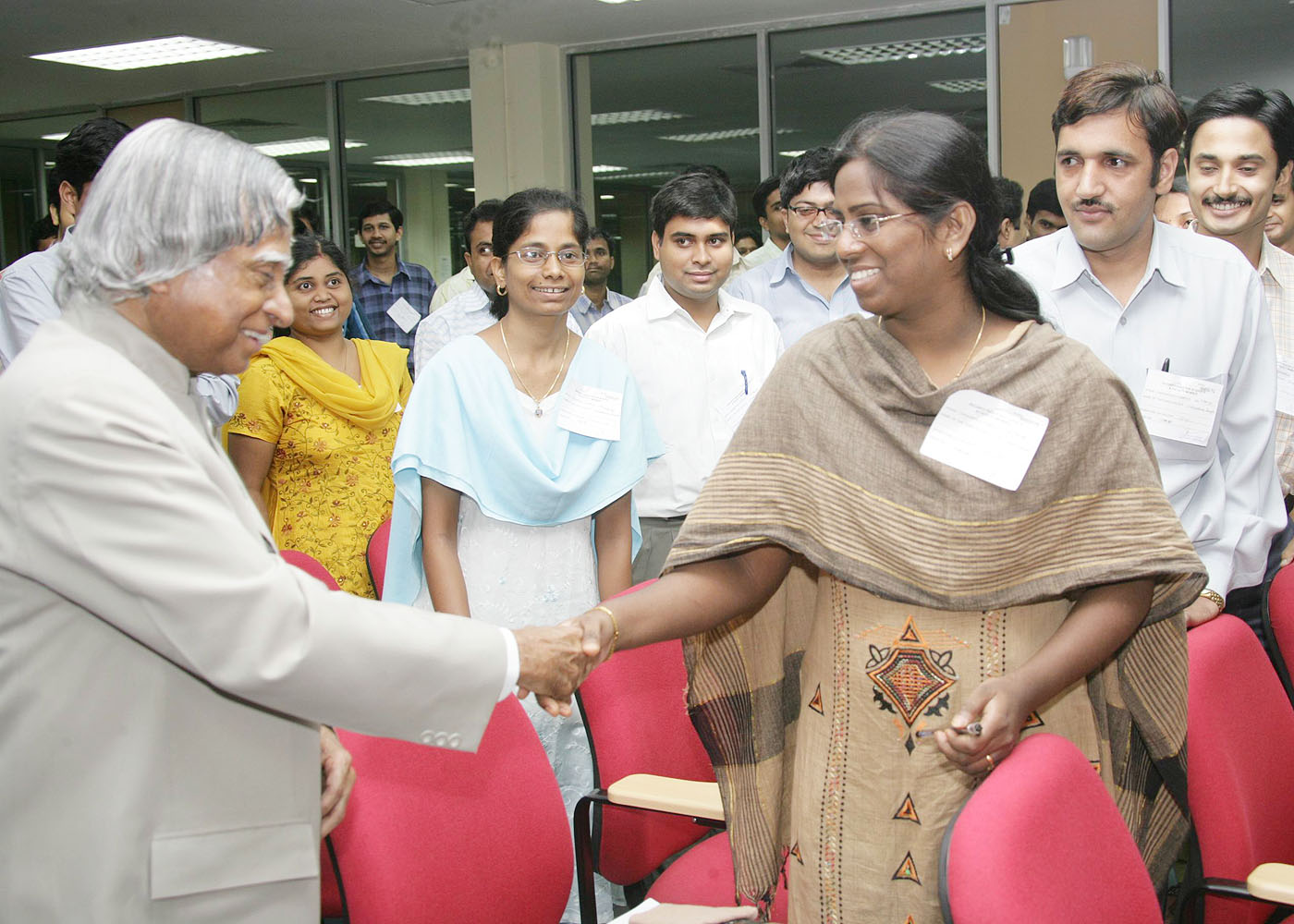
Nano Computers: Molecular switches and circuits along with nano cell will pave the way for the next generation computers. Ultra dense computer memory coupled with excellent electrical performance will give the society low power, low cost, nano size and yet faster assemblies.
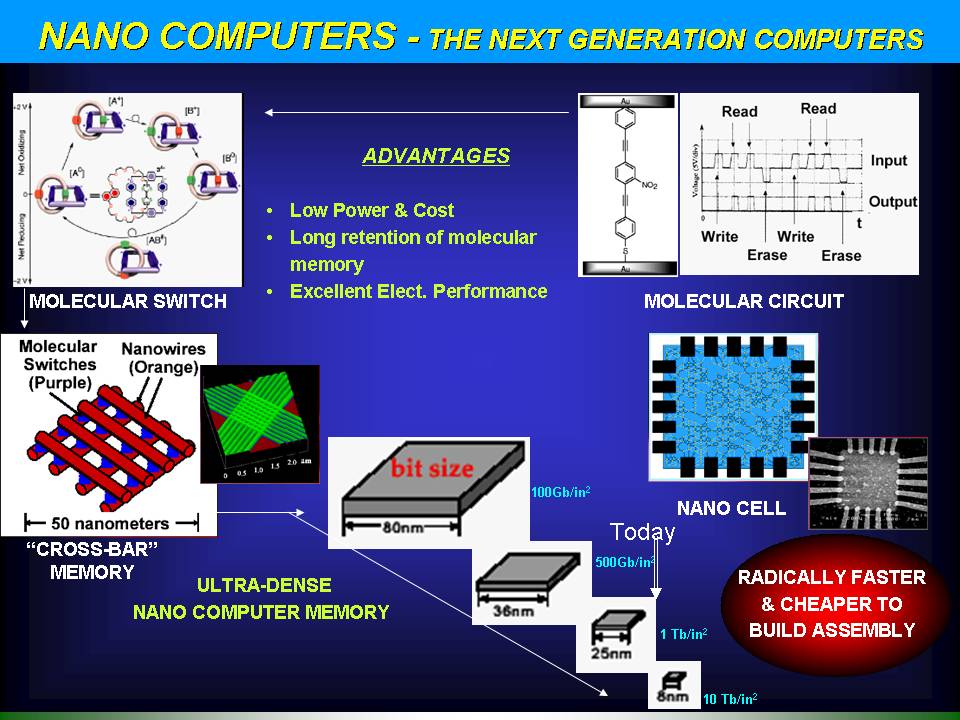
Bio-Nano Technology: Nano Bio medical sensors will play a major role in glucose detection and endoscopic implants. Drug delivery system will revolutionize the healthcare to a large extent.
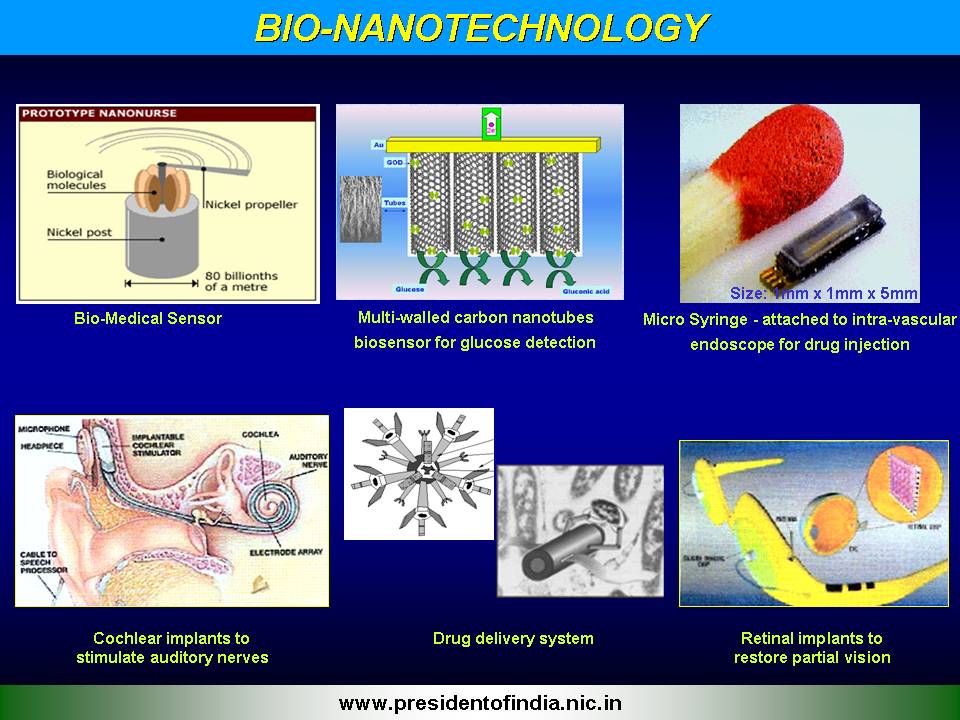
The last four decades have also effected the packaging concept. Electronics packaging of the past has given way to the present Microsystems packaging and the shift in the trend is now towards the futuristic nano packaging.
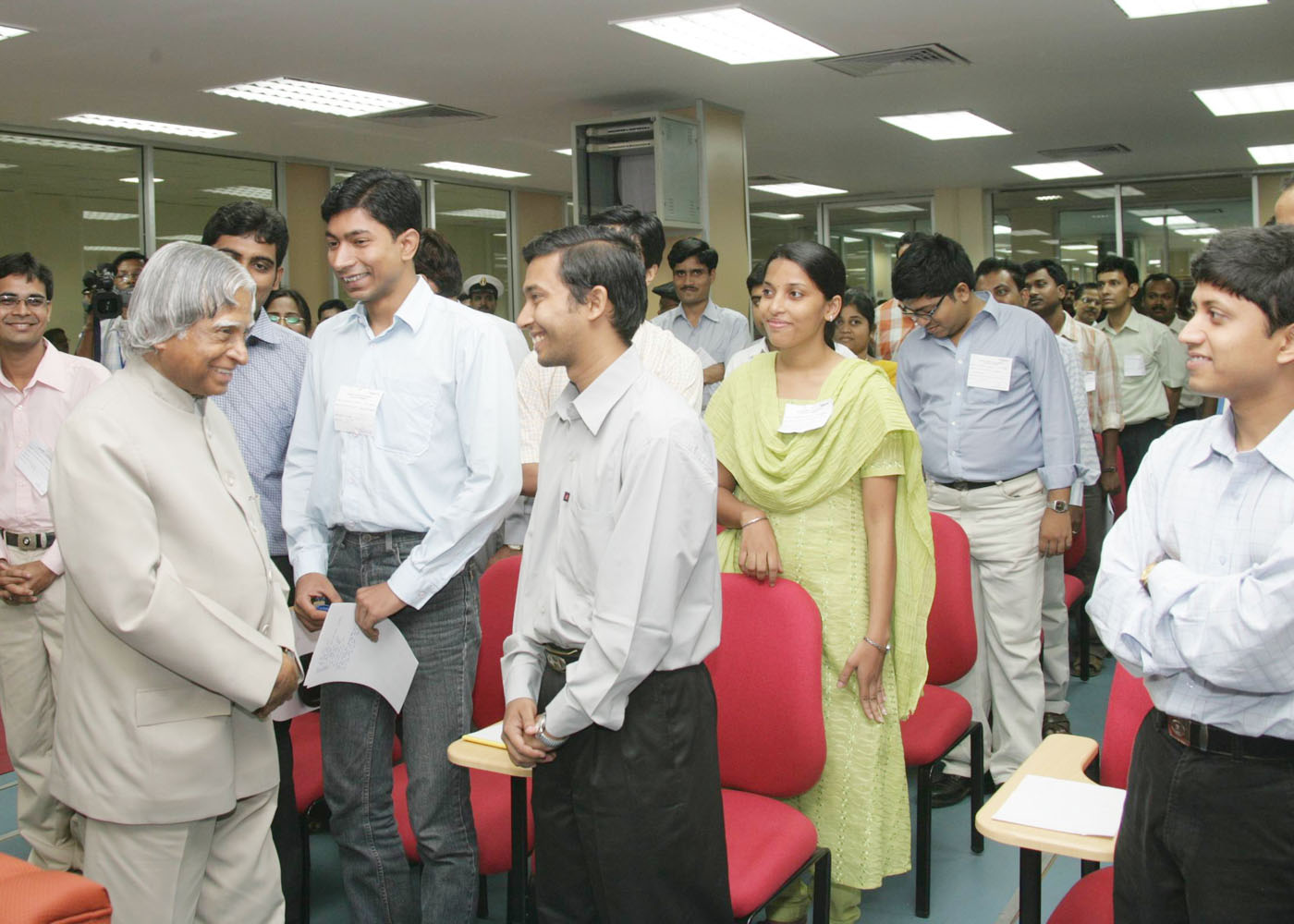
Nano Robots: Doctors and medical experts are evincing gained keen interest in the field of mechano-compatibility for the human body in the past few years. The purpose is to create a nano robot within the human body which can operate both chemically and physically. Although there are currently biomedical instruments and procedures used by physicians to explore tissues and cells, there is a new field of interest in exploring the human body with nano robots. These nanorobots must pass through a person?s body without causing excessive bruising, itching, and other disturbances. The key for success in this field of study is finding a way nanorobots can perform the maximum amount of biomedical operations with the least amount of irritation and other possible illnesses to the patient.
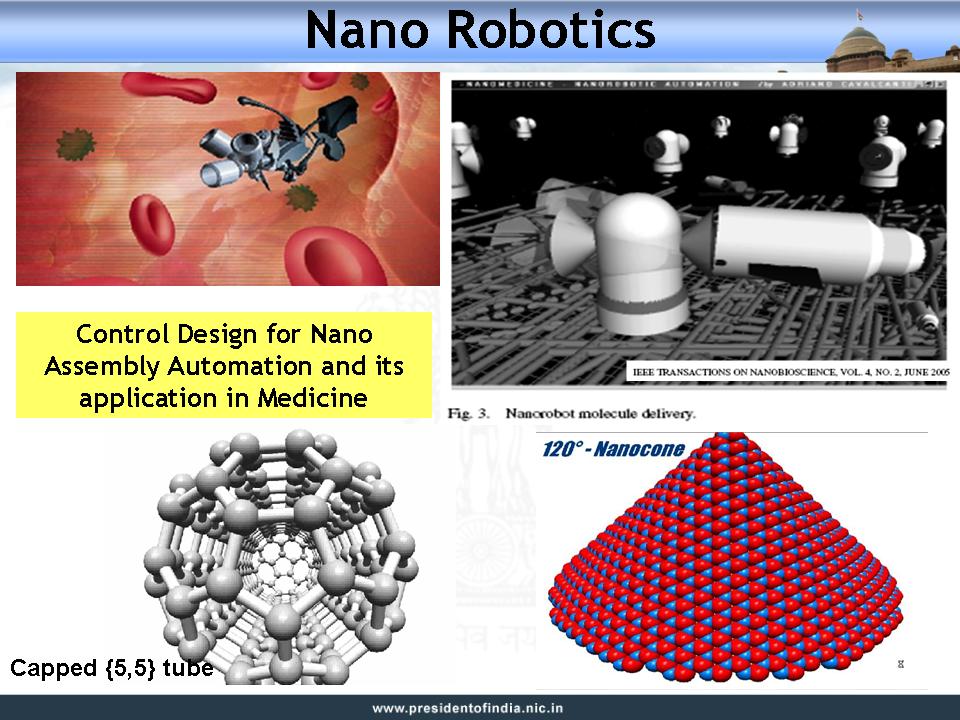
Soft Lithography and Nano scale printing: Soft lithography is generally used to construct features measured on the nanometer scale, has some unique advantages over other forms of lithography (such as photolithography and electron beam lithography). They include the following:
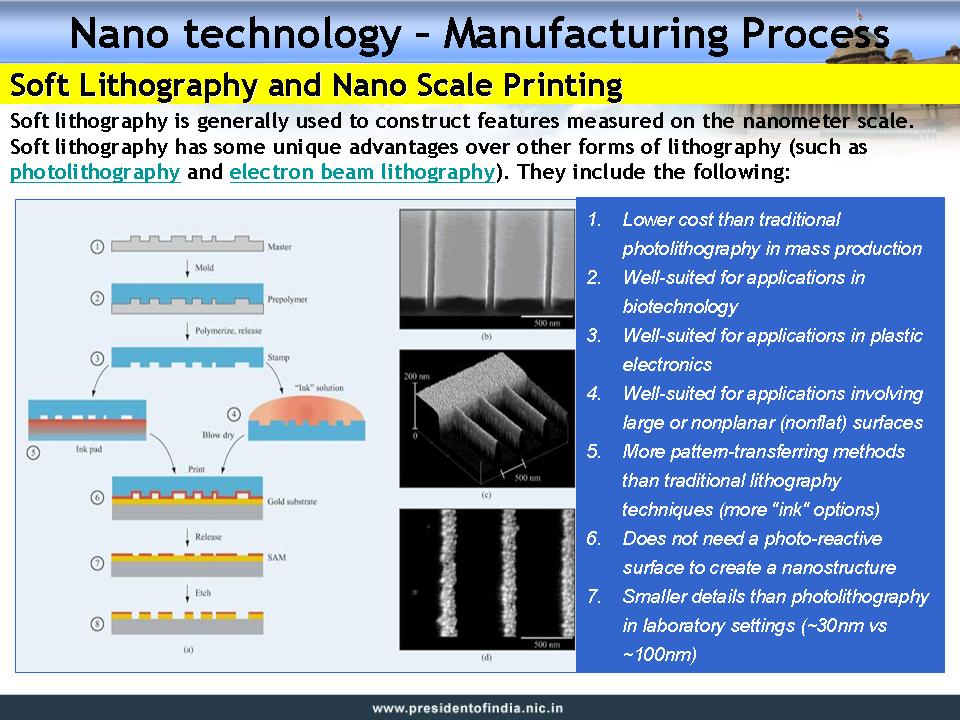
1. Lower cost than traditional hotolithography in mass production
2. Well-suited for applications in biotechnology
3. Well-suited for applications in plastic electronics
4. Well-suited for applications involving large or nonplanar (nonflat) surfaces
5. More pattern-transferring methods than traditional lithography techniques (more "ink" options)
6. Does not need a photo-reactive surface to create a nanostructure
7. Smaller details than photolithography in laboratory settings (~30nm vs ~100nm)
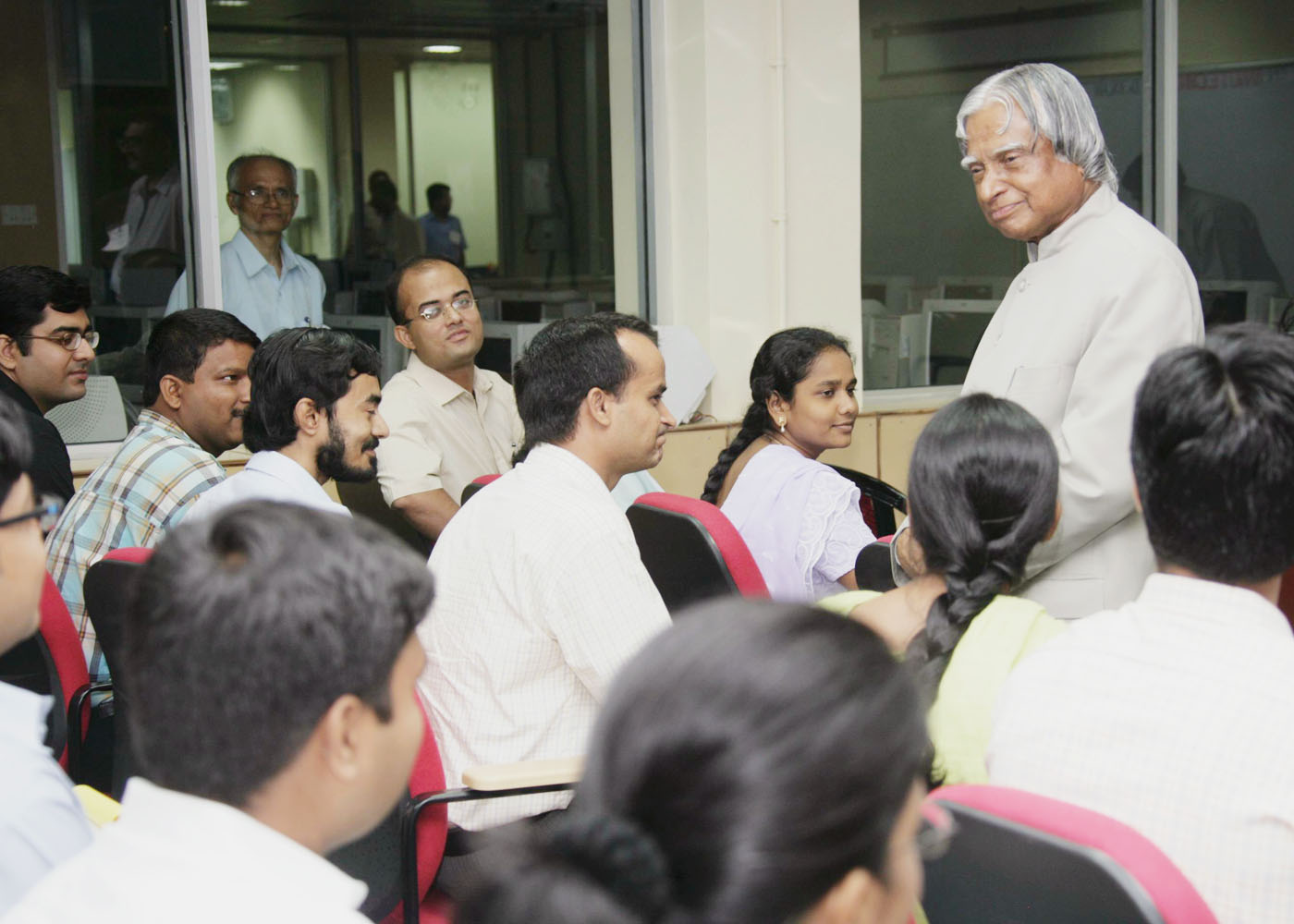
Fuel Cell: Fuel cells have a Global market of $100 billion by 2010. It has a promising future to fuel our automotive industry, power grid and battery for all type of applications mobile, portable and stationary use.
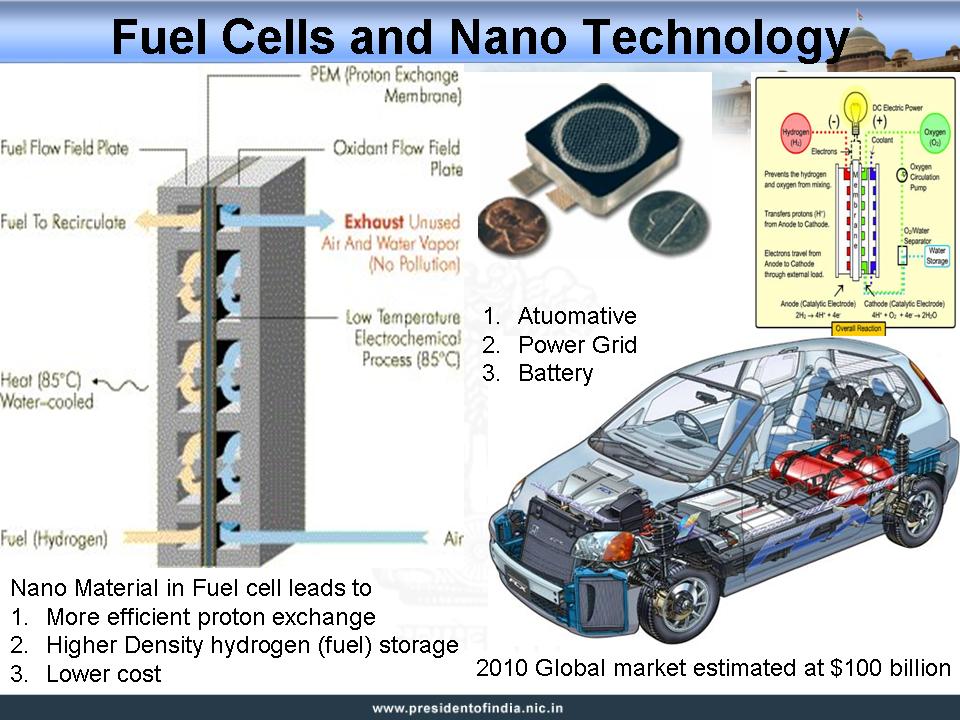
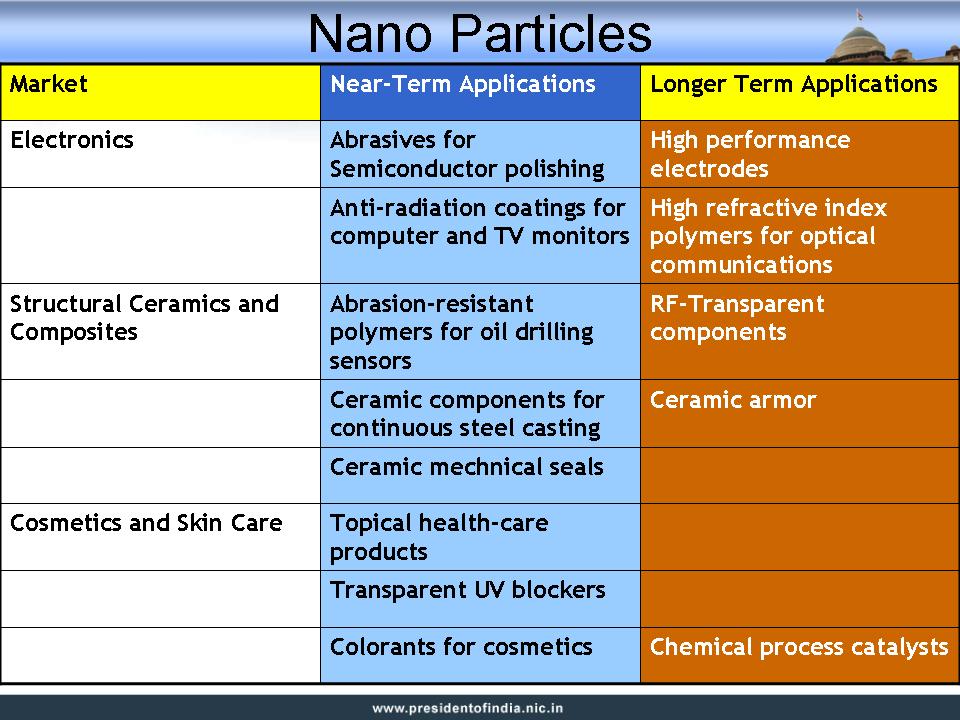
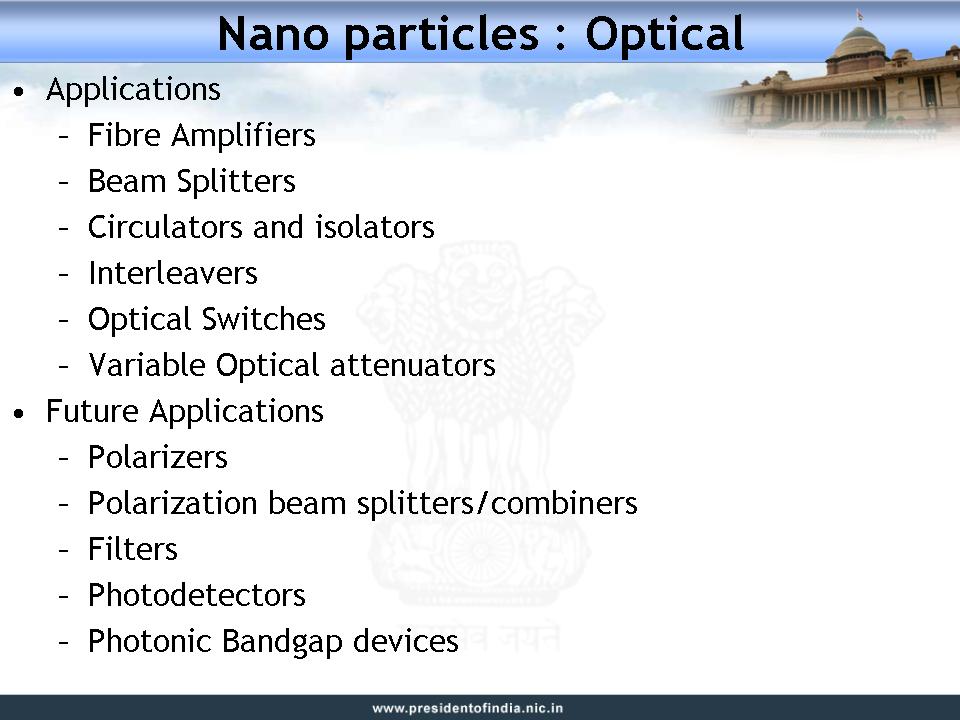
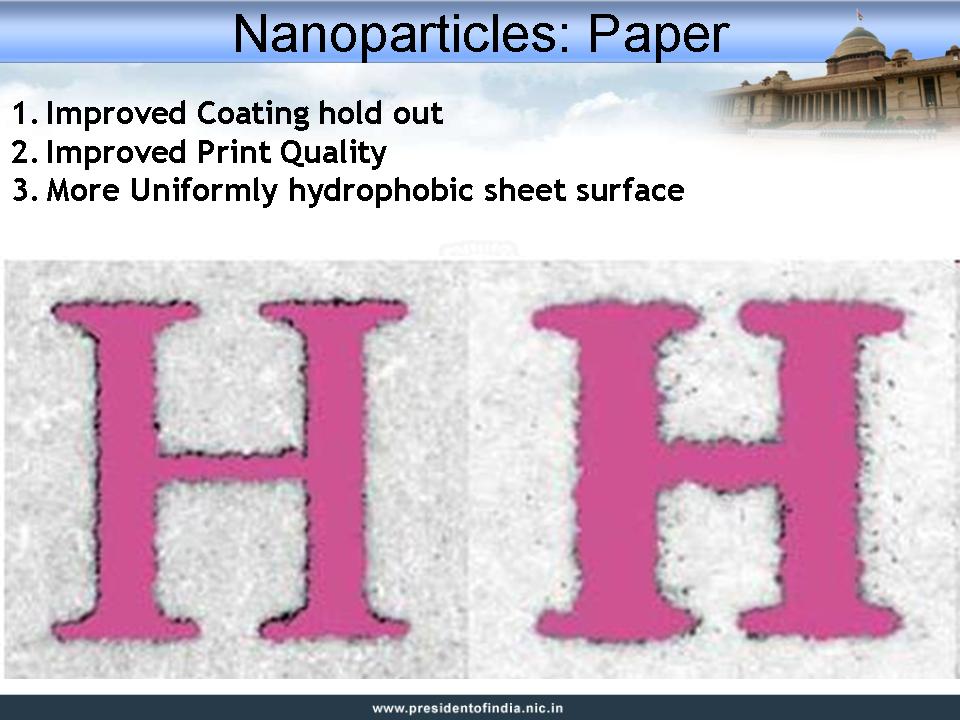

Global Funding
Today, a few countries such as USA, Germany, Japan, UK, have already taken the lead and have invested more coherently and cohesively in thrust areas of Nanotechnology. The global funding for Nanoscience and tech-nology has now risen to approximately 5 billion USD in 2007.
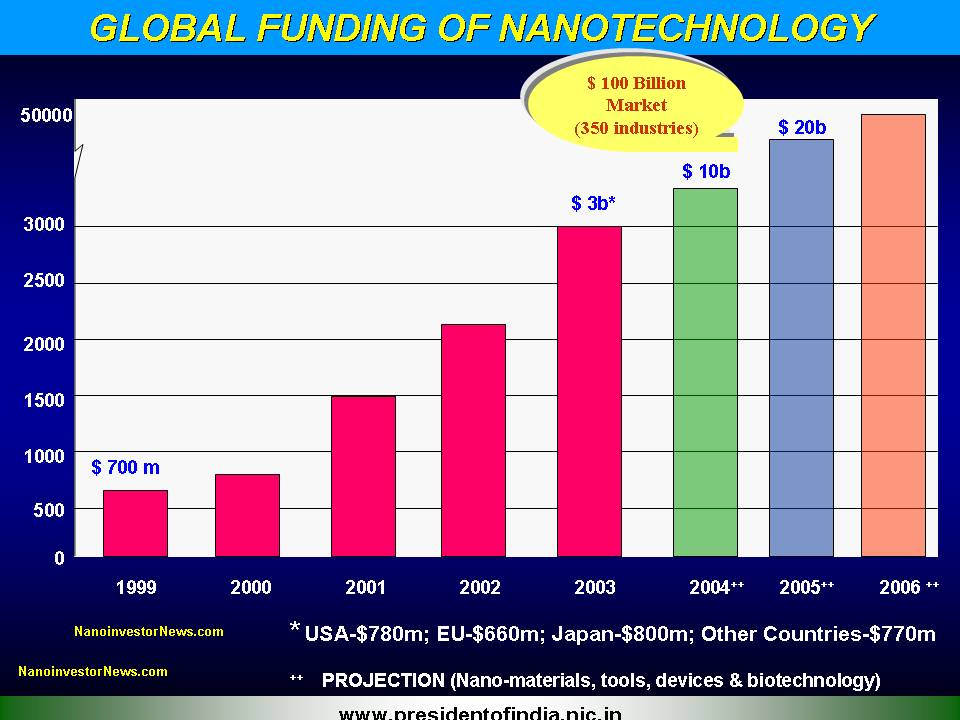

Triad of Nano-Bio-Info Technologies
Now we believe Nanotechnology is such a new technology that is knocking at the doors. It has wider applications compared to information tech-nology and is likely to touch the common man. It will be the central focus for many technologies to converge and open a large number of applications. Further, this technology will have a large domestic market potential leading to a robust economy.
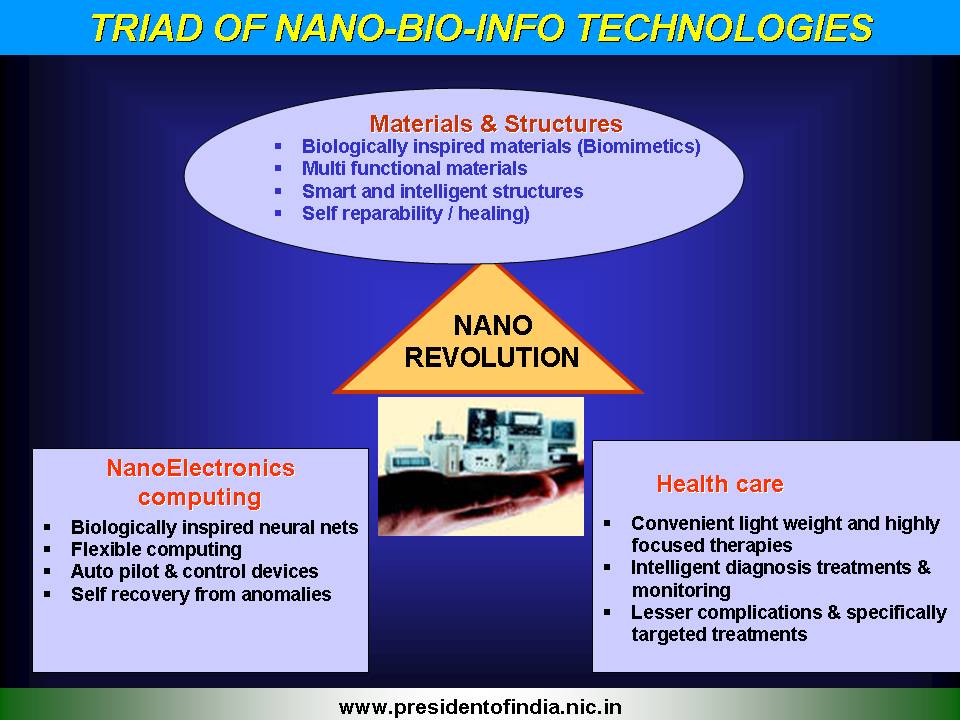
If one sees the world nano publications scenario, we realize that India has a long way to go. Rapid advances both in terms of materials and devices are taking place globally. Almost, 300 novel materials and 50 devices with unique characteristics have been successfully developed around the world. Many of these inventions in materials and devices that are being created today by nanotechnology were beyond human imaginations few years back. Further, this technology will have a large domestic market potential and hence would be a very robust and would be immune to the changes that would take place beyond our borders.
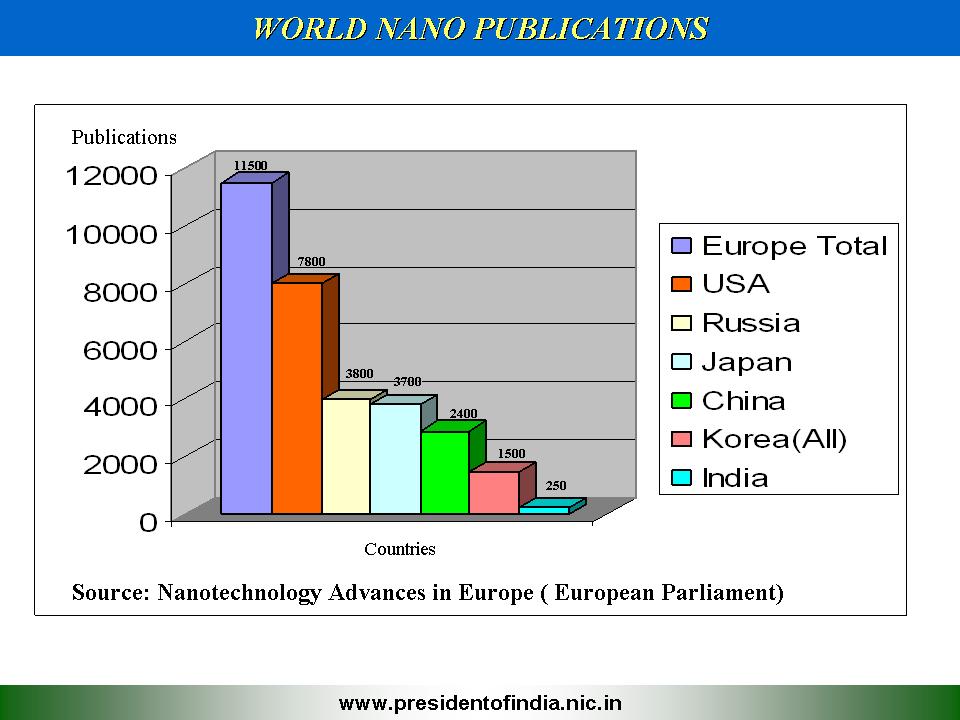
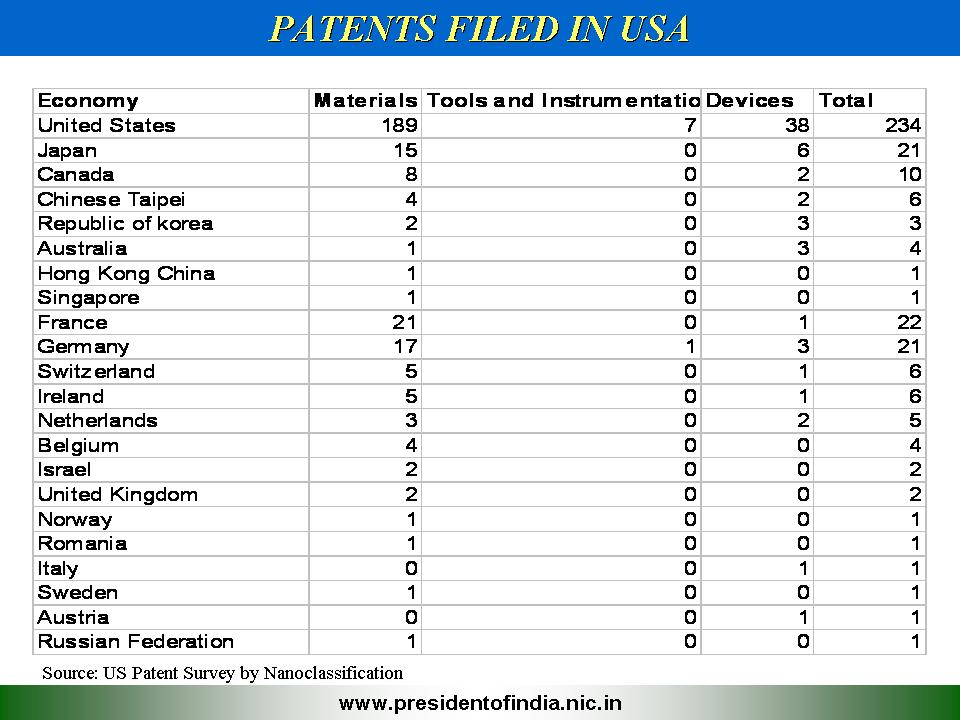
Next ten years will see nano technology playing the most dominant role in the global business environment and is expected to go beyond the billion dollar estimates and cross the figure of 1 trillion.
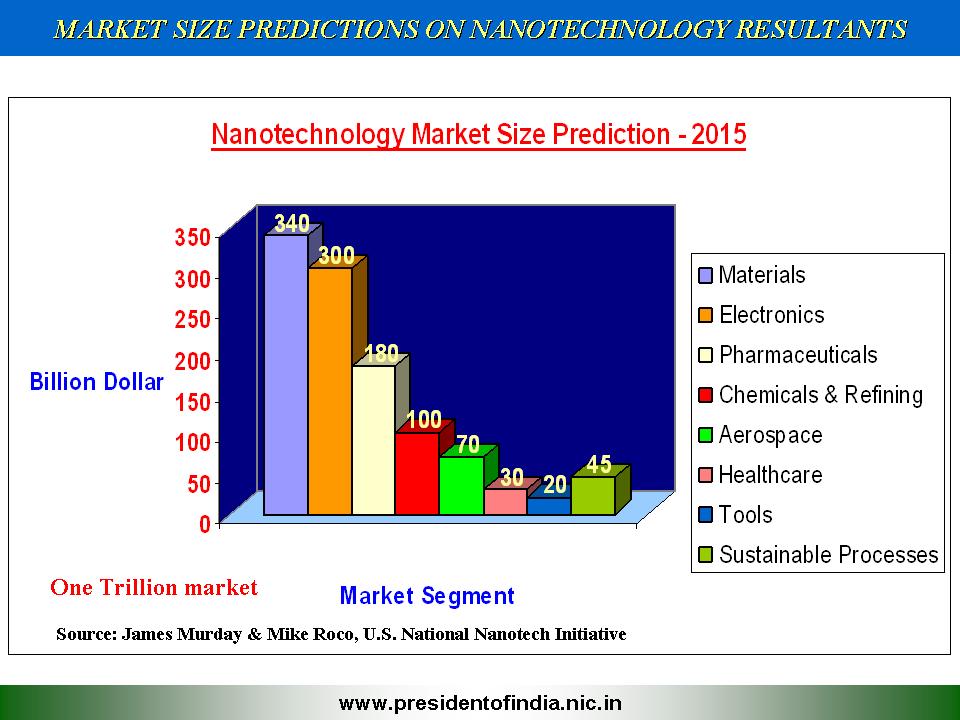
Globally, it is seen that large number of universities, academic institutions and companies have already starting making concrete efforts.
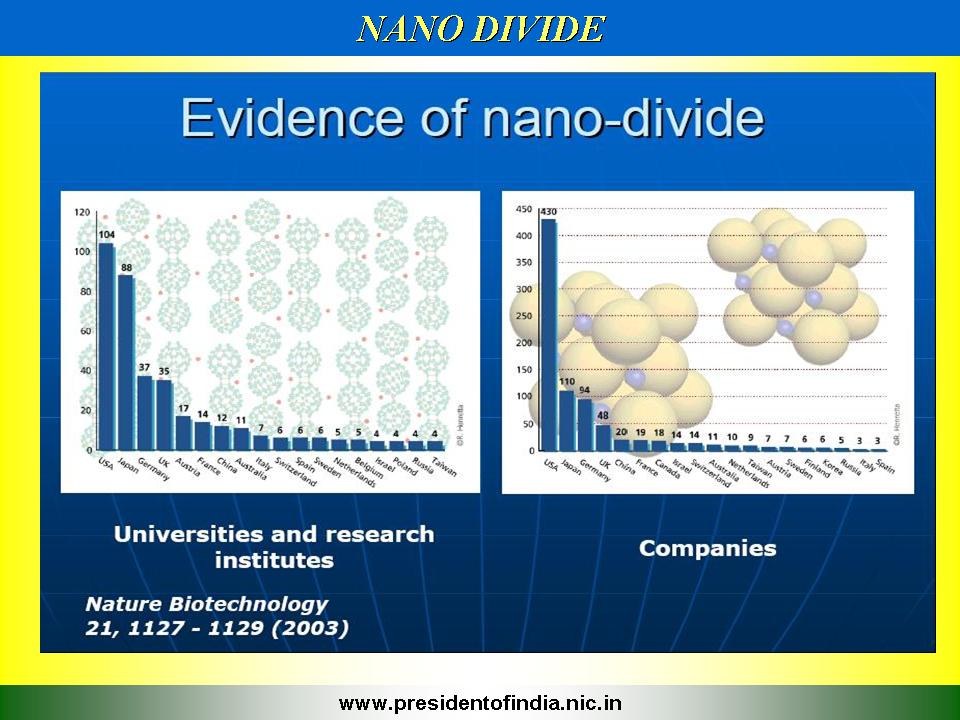

Indian Scenario
In India, modest beginnings have been made by some of the pioneers present in this room. Today, only a few institutions are contributing towards this pioneering research. A lot more needs to be done and we have to formulate an action plan by pooling all the available national resources. We are all meeting here so that we could evolve a national road map for enhancing our capabilities, identifying the gaps and steps required to make India a significant player in Nanoscience and Nanotechnology. Both Government and Private sectors have to join hands and form a ?Nano-Tech Enterprise?.
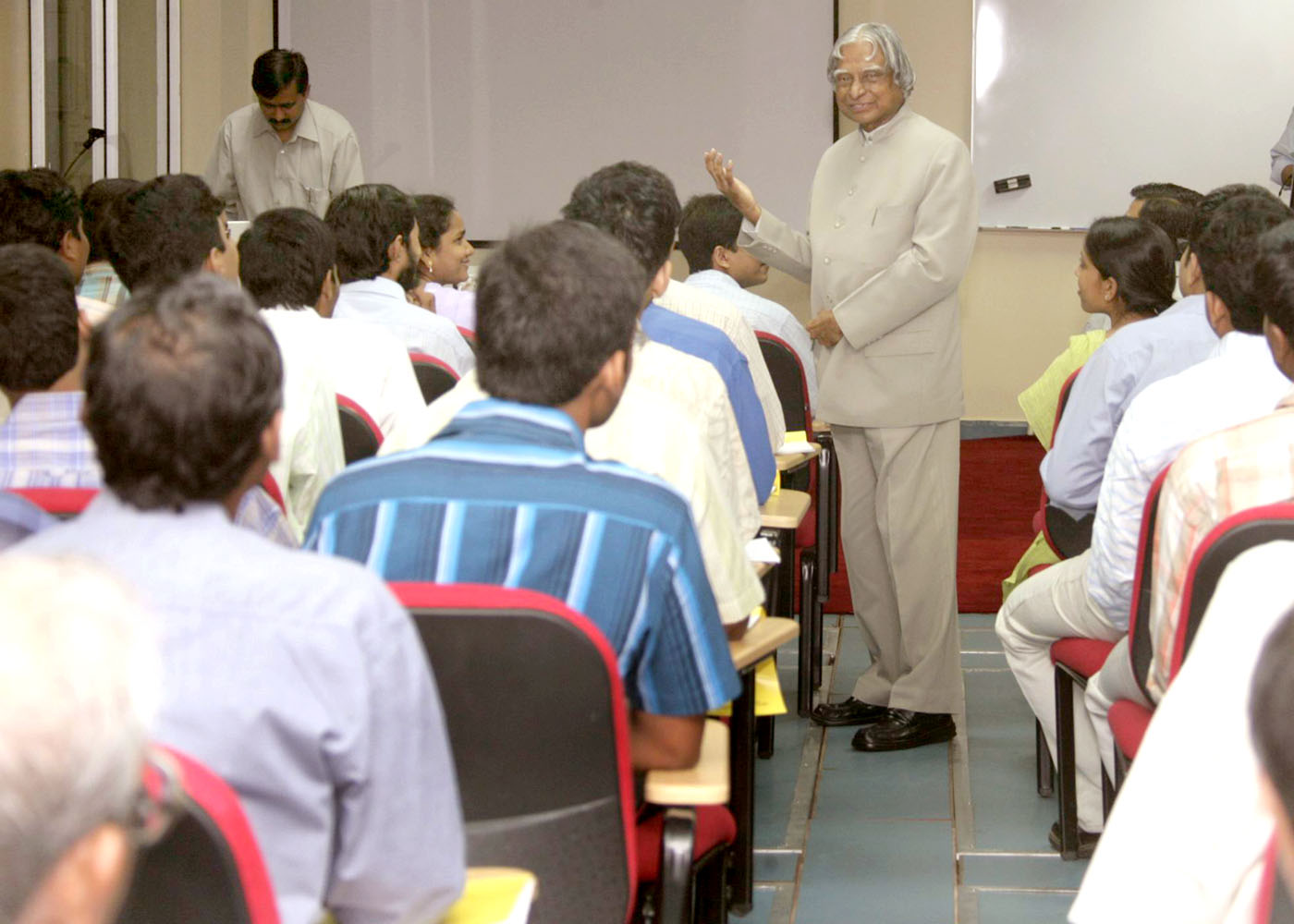

Integrated approach
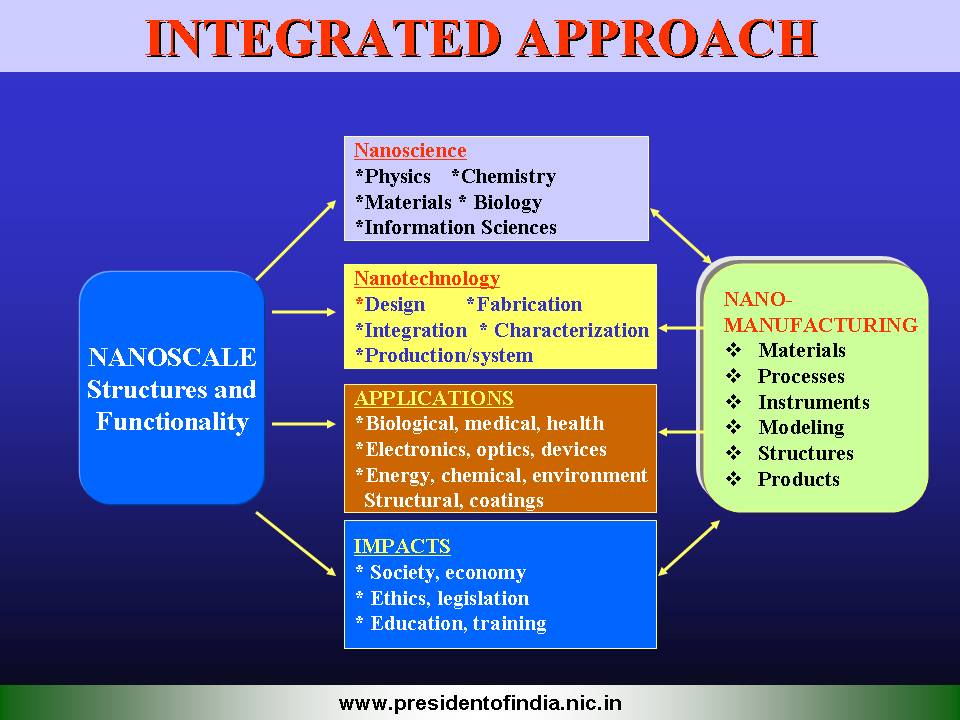
For us to succeed in manufacturing of nano products and their deployment we need to tackle the issues of science and technology, product development and societal aspects in an integrated way. Judging by the past experience of the country in driving technology missions like in Aerospace, Agri-culture, Atomic energy and IT, I am confident that, if we take in a mission mode with a clear-cut vision, the country will reap the benefits of nanoscience and technology.

The Future Challenges
- Reproducible mass production (kg levels) of identical high quality CNT.
- Development of self-sustaining, self-replicating hybrids of CNT and silicon to perform augmentation and repair of DNA
- Development of intelligent wearable systems using nano technology Solution to Cancer, Parkinson & AIDS diseases: through biosensors, devices and drug delivery systems
- Realisation of molecular sized machines.Remote sensing through nano Unmanned Aerial Vehicles and satellites
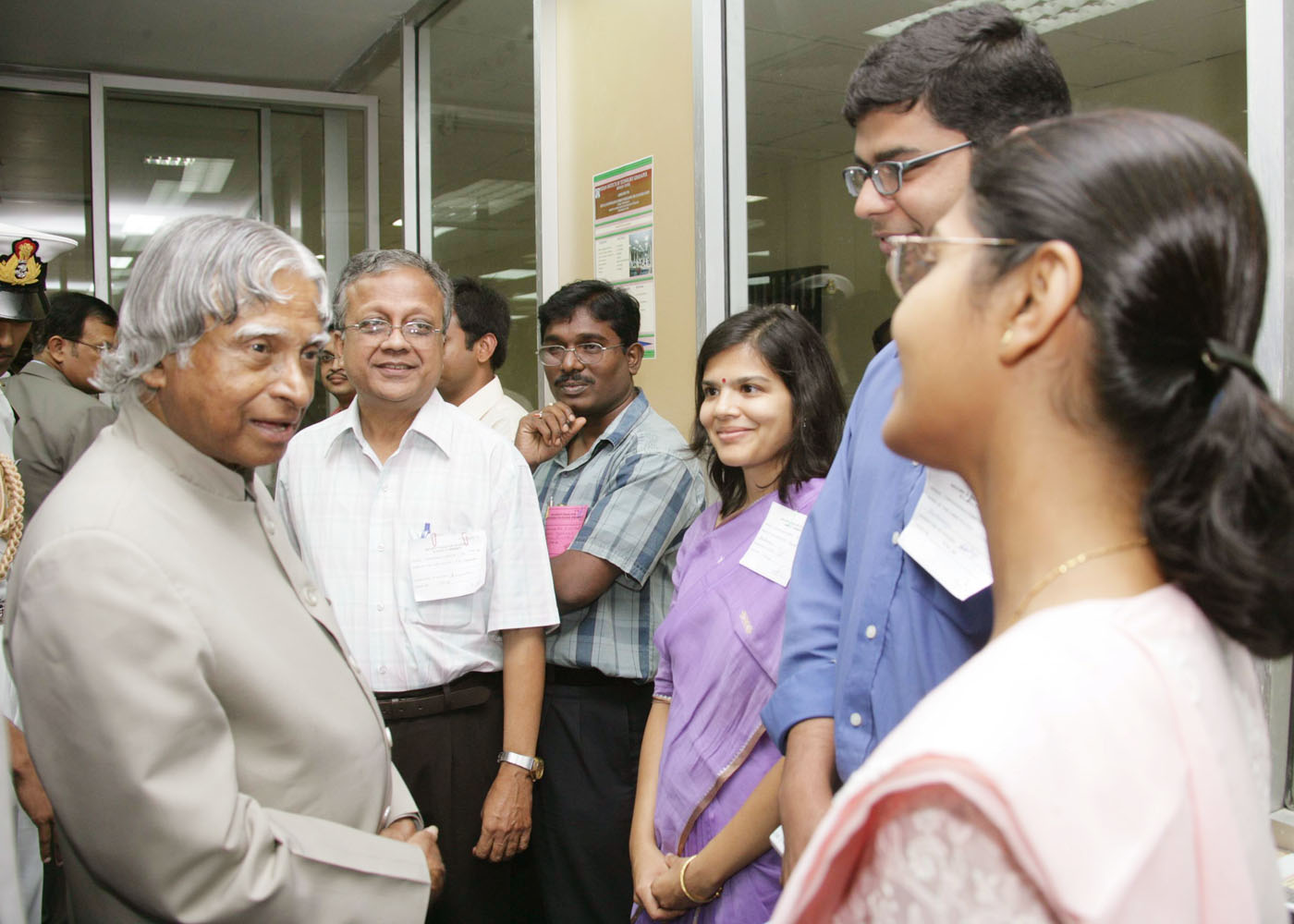

Conclusion
My interest with reference to Nano science and technology is: fast national development, I am convinced that nano is the greatest building block for healthcare, structural material, in electronics, automation etc and will become the platform for new cutting edge technologies to grow for better living of the mankind. I know many of you are toiling hard to push the frontiers of nanoscience. Certainly the convergence of technologies will provide you tremendous opportunity for contributing towards national development. In my second lecture, let me talk to you on some of the nano technological work that is happening in our country leading to number of applications. I will also discuss some of the frontier areas which are required for our developmental missions.
Reference:
1. Prof. CNR Rao, Nanotubes and Nanowires, (Chapter 1, Section 6: ?Corbon Nanotube components and their properties? and Chapter 3: ?Inorganic Nano Wires?, Section 10 ?? ?Useful properties and potential applications?.
2. Scientific American India, May 2007 ? Carbon Nanonets (Random networks of tiny carbon tubes can make flexible devices such as ?Electronic paper?, printable solar cells?)
3. Nano Technology Market and Company Report, 2003 ?Findings hidden pearls?. Prof. Dr. Hans-Jorg Fecht and others, WMtech/University of Ulm
4. Nanotechnology ? A Future Technology with Visions Appin Labs, 2007
5. Reference: www.nanoinvestor.com
6. Reference: www.forbes.com
May God bless you.
Dr. A. P. J. Abdul Kalam
<<Back
|